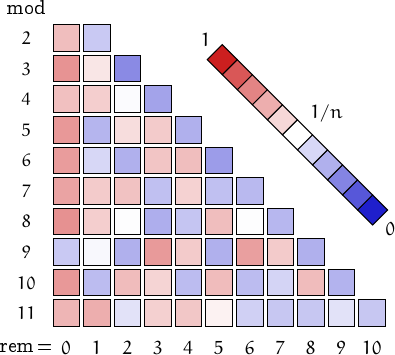The known idoneal numbers are :
1, 2, 3, 4, 5, 6, 7, 8, 9, 10, 12, 13, 15, 16, 18, 21, 22, 24, 25, 28, 30, 33, 37, 40, 42, 45, 48, 57, 58, 60, 70, 72, 78, 85, 88, 93, 102, 105, 112, 120, 130, 133, 165, 168, 177, 190, 210, 232, 240, 253, 273, 280, 312, 330, 345, 357, 385, 408, 462, 520, 760, 840, 1320, 1365, 1848.
Distribution of the remainders when the numbers in this family are divided by n=2, 3,..., 11. (I took into account 65 values, from 1 to 1848).
| n\r | 0 | 1 | |||||||||
|---|---|---|---|---|---|---|---|---|---|---|---|
| 2 | 40 | 25 | 2 | ||||||||
| 3 | 37 | 25 | 3 | 3 | |||||||
| 4 | 24 | 22 | 16 | 3 | 4 | ||||||
| 5 | 26 | 4 | 15 | 17 | 3 | 5 | |||||
| 6 | 22 | 9 | 2 | 15 | 16 | 1 | 6 | ||||
| 7 | 18 | 12 | 13 | 4 | 11 | 4 | 3 | 7 | |||
| 8 | 20 | 10 | 8 | 1 | 4 | 12 | 8 | 2 | 8 | ||
| 9 | 4 | 7 | 1 | 17 | 9 | 1 | 16 | 9 | 1 | 9 | |
| 10 | 16 | 2 | 10 | 7 | 2 | 10 | 2 | 5 | 10 | 1 | 10 |
| 11 | 10 | 11 | 5 | 7 | 8 | 6 | 4 | 3 | 3 | 5 | 3 |
A pictorial representation of the table above

Imagine to divide the members of this family by a number n and compute the remainders. Should they be uniformly distributed, each remainder from 0 to n-1 would be obtained in about (1/n)-th of the cases. This outcome is represented by a white square. Reddish (resp. bluish) squares represent remainders which appear more (resp. less) frequently than 1/n.
e-mail: info -at- numbersaplenty.com • Privacy notice • engine limits